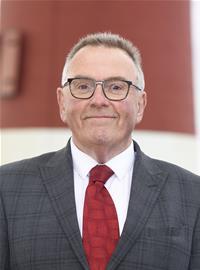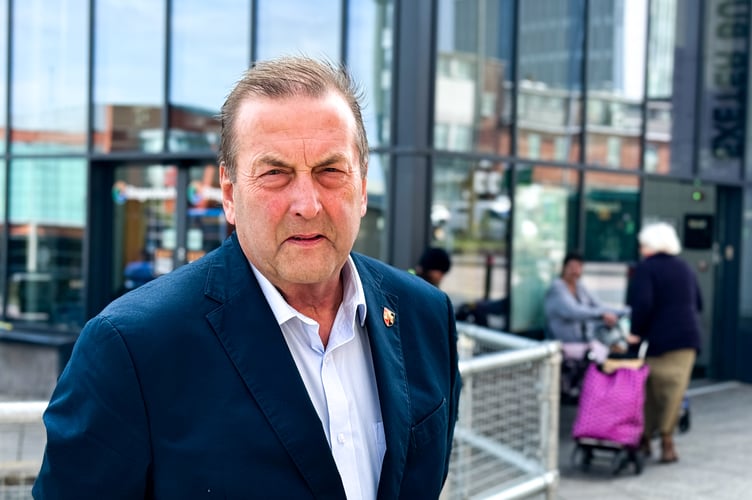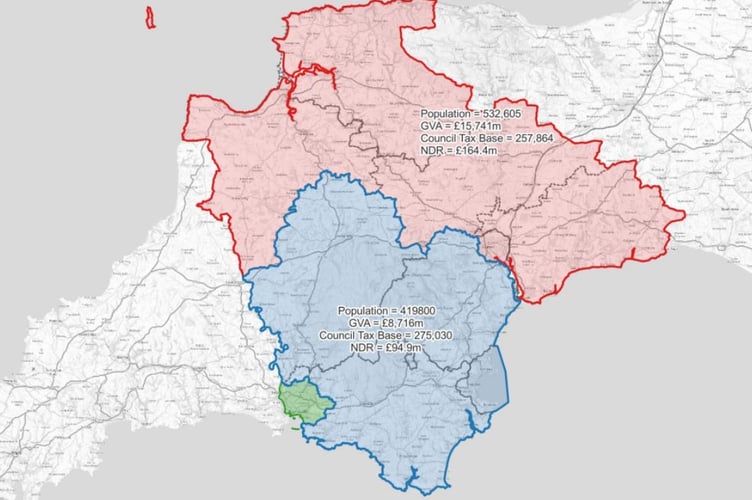PLYMOUTH and Exeter Council Leaders have today, Friday, October 31, announced their united support for a bold new vision for local government in Devon – backing a four-unitary model that reflects how communities live, work and will grow.
This follows the announcement earlier today from Torbay Council.
Following months of collaboration, public engagement and strategic analysis, councils will now consider proposals for four unitary authorities, one each for Plymouth, Exeter, Torbay, and Devon coast and countryside.
Together they agree that this model is the best way to deliver sustainable services, unlock economic growth and empower communities across Devon.
These proposals respond directly to the Government’s call for reform and reflect the shared ambition of Devon’s urban centres to lead the region into a more resilient, responsive and sustainable future.
Large urban areas like Plymouth, Exeter and Torbay are the engines of growth for both urban and rural communities. They drive investment, create jobs, and deliver services that reach far beyond their boundaries into surrounding towns and villages.
The fourth unitary council will be one based on coast and countryside and focussed on dealing with rural issues. This will centre on a town-hub model, with market towns acting as vital centres, serving their local communities and surrounding areas.

Councillor Tudor Evans, Leader of Plymouth City Council, said: “The two-tier system has failed Devonians. This is a once-in-a-generation opportunity to reshape how local government works - not just for Plymouth, but for every corner of Devon. Our proposal puts people first, with a model that reflects how communities live, connect, and thrive across the region.
“This isn’t just about redrawing boundaries, it’s about building a smarter, fairer future. It brings together the ambition of our cities, the strength of our towns, and the character of our rural and coastal communities.
“With four focused councils working together, we can deliver better public services, unlock investment, and give every part of Devon a stronger voice. We’re asking the government to back a vision that works for everyone - from Barnstaple to Brixham, Exeter to Ivybridge.
“Smaller unitary councils like Plymouth and Torbay have shown they can deliver, and Exeter continues to punch above its weight. But size isn’t everything - economies of scale can hide serious structural issues and weaknesses, as we’ve seen in Devon. This model gives us the best of both worlds: councils that are big enough to be sustainable, but close enough to stay accountable.”

Exeter City Council says it has long championed coordinated growth across its wider housing and economic area and sees the four-council model as a natural evolution.
It proposes including parts of Mid Devon including Crediton and Tiverton and parts of East Devon into a wider Exeter plan.
Councillor Phil Bialyk, Leader of Exeter City Council, said: “A lot of work has gone into developing these proposals for local government reorganisation, and during that work it has become obvious that the interests of Exeter and the rest of Devon will be best served by four councils.
“Devon’s urban areas are the engines of growth for the whole of the county, and this model recognises the unique characteristics of Devon’s urban and rural landscape and communities.
“In Exeter we have cross-party support for our proposals, and we will continue to work closely with town and parish councils and local communities in the surrounding areas to ensure that they are fully empowered by reorganisation.
“I very much welcome the support of our colleagues in Plymouth and Torbay in developing proposals that will ensure that the whole of Devon can thrive in the future.”
Exeter’s proposals for local government reorganisation will be discussed at a Special Strategic Scrutiny Committee on November 3, followed by and Extraordinary Meeting of Exeter Council on November 25 and Special Executive on November 26.
Subject to approval, the Exeter proposal will be submitted to Government on November 28 for their consideration.

OTHER ALTERNATIVES
Almost all of the district councils in Devon favour a “1-4-5” line-up, although there is growing support for a “1-4-5-plus” variant.
Under the 1-4-5 proposal, Plymouth would be the one unitary, with the rest of Devon divided up into a four-strong unitary comprising Torbay, South Hams, Teignbridge and West Devon along with a five-strong council of Exeter, East Devon, Mid Devon, North Devon and Torridge.
The committee heard that “1-4-5-plus” would allow Plymouth to spread its boundaries to include five of its neighbouring South Hams parishes. The new town of Sherford would be among them.
Teignbridge chief executive Phil Shears told Teignbridge members recently that 1-4-5-plus was the “most balanced” option.
Council leader Richard Keeling (Lib Dem, Chudleigh) added: “What is for sure is that Teignbridge and Devon County Council will no longer exist.
“I haven’t heard of any names for the new councils being bandied around as yet.”
Teignbridge has so far put its name to the 1-4-5 proposal, as have West Devon, South Hams, East Devon, Mid Devon, North Devon and Torridge. North Devon, however, is seeking a strategy which does more to protect the interests of the north of the county.
Devon County Council favours having Plymouth and Torbay as stand-alone unitaries, with the whole of the rest of the county – including Exeter – making up a third unitary authority. Leader Julian Brazil (Lib Dem, Kingsbridge) described this as the “least worst” option.
The new authorities could take over by May 2028.





Comments
This article has no comments yet. Be the first to leave a comment.